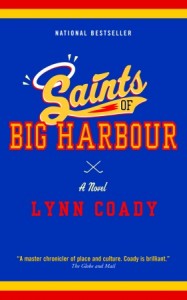 Anyone who might dismiss Lynn Coady’s masterful Saints of Big Harbour as a regional novel would be selling themselves short, I think. Yes, it’s set in Nova Scotia in a small town adjunct to an even smaller hamlet where life resists any change that doesn’t first come in the form of a rumour; and yet, it’s as a pure novel that explores the ideas of love, life, and family as I’ve ever read anywhere. The whole book just swooped in and stole my heart.
Anyone who might dismiss Lynn Coady’s masterful Saints of Big Harbour as a regional novel would be selling themselves short, I think. Yes, it’s set in Nova Scotia in a small town adjunct to an even smaller hamlet where life resists any change that doesn’t first come in the form of a rumour; and yet, it’s as a pure novel that explores the ideas of love, life, and family as I’ve ever read anywhere. The whole book just swooped in and stole my heart.
Guy wants nothing more than to date a girl “not from around here.” “Here” being the place where he’s grown up, outside of town, with a single mother, a sister who has already escaped, and a half-crazed uncle hell bent on ruining his life all the while claiming to save it. And when the girl of his dreams turns out to be slightly unhinged (or a teenager), his life takes a complex turn. As if being a teenager isn’t hard enough, Guy has to contend with Isadore, his unhinged, alcoholic uncle, whose violent, angry, controlling tendencies keep his family under continual threat of emotional explosion. And when Corinne Fortune makes up a story about him, avoiding violence (from her brother, from his uncle) becomes a way of life for poor Guy.
It’s a multi-perspective novel, and more and more Coady’s writing reminds me of other great Canadian storytellers like Paul Quarrington. There’s an element of humour. An instance of absurdity. And yet, it feels so utterly honest and real, and depicts a life that if I took one step to the right, I could completely see myself living. That’s how real her characters feel to me. The story barrels along and it hums with efficiency — there’s so much truth in the telling, from her portrayals of alcoholism to the unhappiness of a teenage girl, that I was consistently amazed at the evenness of Coady’s storytelling — it never falters, never waivers.
I admire her writing so much for it’s lack of artifice, if that makes any sense. She creates raw, open sentences that hum with humanity. A richness of human experience that exploits the everyday without mocking it. These are everyday people. These are characters I recognize with faults and fears and frustrations that are as universal as they are particular to this story. When Guy quits the hockey team the disappointment his uncle shouts to the rafters is palpable. When Corinne’s brother finally moves out of the house and discovers what freedom actually means to him, it’s fascinating. When Alison Mount, a high school teacher and co-drunk of Isadore’s finally gets sober, the ache of the hangover drips off the page. There’s an emotional resonance and richness to this novel — it’s different from Mean Boy, less about hero worship and more about familial survival, and perhaps that’s why I loved it so much, there was so much I could relate to and yet there’s nothing remotely similar in this novel to my life. Yet, that’s how Coady subtly brings the universal to this novel about a particular time and place in Canada, and in that her skill is unparalleled.
P.S. I also finished Saving Rome, a short story collection by Megan K. Williams, this week for The Vicious Circle book club (#79). To review the book would do it a disservice, I think. Reading it sandwiched between this novel and Better Living Through Plastic Explosives wasn’t necessarily fair — I was harsh towards the book on Saturday when we all got together to discuss it, perhaps unjustly so. There’s something to be said about reading something “good” (but wholly uneven) in between two “greats” but I don’t necessarily feel like digging into all the reasons why I found the book uneven and kind of meh.
This is my favourite book by Coady so far. Her newest book is in for me at the library, though.